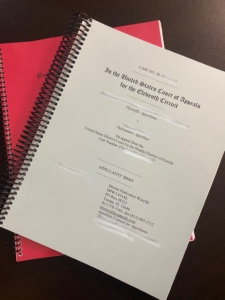What Are Costs on Appeal in Federal Court?
When is a Party Entitled to an Award of Appellate Costs?
Under Federal Rule of Appellate Procedure 39, costs are automatically taxed against the losing party if the judgment is affirmed or reversed in full and the Court does not rule otherwise. If there is a partial victory, costs are only taxed as the Court orders. So in most cases, one party is going to end up paying the other party’s costs.
When Must the Party Entitled to Costs File the Bill of Costs?
A bill of costs is due to the appellate Court no later than the later of 14 days from the Court’s opinion issuing, or 14 days from the date the Court rules on a timely post-opinion motion for rehearing or rehearing en banc. Fed. R. App. P. 39(d). The bill of costs be itemized, verified, and include receipts if copies were made by an outside vendor.
What Types of Costs Are Appellate Taxable Costs?
While a party may have paid other kinds of costs to their counsel or vendors on appeal, only the costs specifically set out in the rules are taxable on appeal. There are two categories of costs: Those awarded by the appellate court, and those awarded by the trial court.
Which Costs Are Awarded by the Appellate Court?
As to the appellate court, the party against whom costs have been taxed must both pay the court’s docketing fee, and the costs the other side incurred making paper copies of documents that are required to be submitted to the Court.
Specifically, the rules provide that the appellate court shall award costs of “producing necessary copies of a brief or appendix, or copies of records authorized by Rule 30(f).” FRAP 39(c). How many copies that is depends on which Court you are in. The default rule under the Federal Rules of Appellate Procedure require service of 10 copies of the Appendix on the Court, along with one copy to each separately represented party, Fed. R. App. P. 30(3), in addition to providing the court with 25 paper copies of each brief and serving two paper copies on each separately represented party. Fed. R> App. P. 31(b). But appellate courts are expressly invited to set their own rules on the number of copies, and the Eleventh Circuit has thankfully reduced the number of trees that become recoverable costs.
In the Eleventh Circuit, a represented party likely filed 2 copies of the appendix, see 11th Cir. Rule 30-1(d). If the case was set for oral argument, the party probably filed three additional copies of the appendix, so the count goes up to 5. Id. It also includes “[o]ne originally signed brief and six copies (total of seven)” copies filed with the Court, along with a paper copy to each party separately represented. 11th Cir. R. 31-3. Count the number of
How Do You Calculate the Costs Awarded by the Appellate Court?
The appellate docketing fee is authorized by statute, 28 U.S.C. § 1913, and is set by the administrative office of the U.S. Courts. Effective December 1, 2020, that docketing fee was set at a flat $500 fee.
The cost of the copies is calculated by multiplying the number of pages required to be filed by a per-page fee that is the greater of the actual costs incurred, or the maximum per-page cost set by each Court of Appeals, which shall reflect local costs and “should encourage economical methods of copying.” Fed. R. App. P. 39(c). In the Eleventh Circuit, that per page figure is currently set at 15 cents per in-house copy, and a max of 25 cents per commercial reproduction, when also supported by receipts showing your actual expenditure. The Eleventh Circuit also has a specific fillable form it expects parties to use as the bill of costs [.pdf]. These costs are generally included in the mandate by the Clerk of Court.
What Costs Are Awardable in the Trial Court?
There are a few other costs specifically taxable by filing an appropriate motion with the trial court, but they usually only apply if the Appellant (the party that lost before the trial court) wins on appeal. Those costs are:
(1) the preparation and transmission of the record;
(2) the reporter’s transcript, if needed to determine the appeal;
(3) premiums paid for a bond or other security to preserve rights pending appeal; and
(4) the fee for filing the notice of appeal.
Generally, the appellate court affirms the trial court’s judgment, there is no basis to request these fees, because they weren’t paid by the Appellee. Still, if you win as an appellant, don’t forget to keep an eye on these fees, which can add up! You will be required to provide supporting documentation (such as receipts) so be sure to keep those as you make the payments.
How Do You Collect Costs Awarded?
In the Eleventh Circuit, parties are required to mail the costs awarded to the other side directly, without further action by the Court.



Leave a Reply
Want to join the discussion?Feel free to contribute!